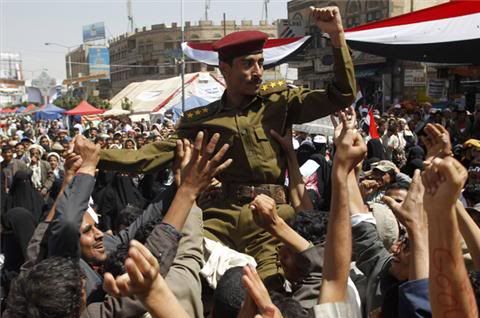
By Peter Jukes
It’s a fair point. As the sound of anti-aircraft fire combined with the distant crumps of explosions disturb the Libyan night, it’s a fair point: are we celebrating death? Are we cheering on exactly the same kind of indiscriminate slaughter which was unleashed in Vietnam and Cambodia, and more recently in Iraq? Democracy, founded on debate and dissent, should never try to silence those questions. It should ask them: Ask them of ourselves, and those in government, or the armed forces, who seek to represent and defend us.
But for once, this isn’t about us. The uprisings in the Maghreb and Mashriq, the revolutions in the Arab World from Morocco to Yemen, Tunisia to Syria, have not been led by us. It’s a spring awakening, as important as 1968 or 1848.
So let us not be diverted by CNN or the Pentagon, or indeed by Libyan or Russian State TV. I hear voices cheering across the Middle East – not for foreign intervention – but self determination.
In Libya’s case, those voices have been cheering the destruction of their dictator’s armed columns: this is not celebrating people dying, but welcoming the depletion of the military machine Gaddafi has built up over forty decades of oil revenues. These Libyans are cheering the routing of an army which is now less able to kill people. So while we worry, and wonder where this current UN intervention might lead, it’s worth considering the principles involved.
If you hate Violence, Sometimes you have to Fight It
Twenty years or so ago I was as near pacifist as you could get: a member of CND, I saw the world being threatened by bellicosity and Mutual Assured Destruction: my image of war was Vietnam rather than D-Day, Nicaragua, Chile, the Falklands.
My personal Rubicon was Sarajevo. As thousands died thanks to sniper fire, machine gun and mortar attacks, I began to question my anti-war Chomskyite position. What if, as my Bosnian friends argued, the fast jets could silence the big guns on Mt Igman. Would I surrender my anti-American rhetoric so that another child would not be shot at her own mother’s funeral?
We were told any NATO intervention would lead to a quagmire. It took many more deaths, particularly 8000 men and boys around Srebrenica, before the fast jets flew, and the big guns were silenced, and the people cheered and wept for joy to see those flashes in the sky. I have friends from both Pristina and Sarajevo. They share none of the reservations about cheering people being killed. They could see this was a way of lessening the violence.
The Voices from the Street
One of those I’ve been listening to is the brave young journalist from Benghazi, Mohammed Nabbous, an important figure in the February 17th Revolution, who ran his own website Libya Alhurra. ‘
‘Mo’ as he was known, with his perfect slightly Oxbridge inflected English, was a champion of democracy. He stayed up night and day to inform the world about the repressions going on in his homeland. He became a victim of those same forces when he was shot dead by Gaddafi’s snipers in Benghazi yesterday, leaving a widow and an unborn child.
Below is the devastating soundtrack of his last ever report by phone. Someone who risked and lost his life in the service of transparency and truth
May he rest in peace and his cause live on.
So this is the voice I listen to, not the ra-ra of right wing jingoists, or even the jargon of the military analysts, but of people yearning to be free, and demanding of us merely to give them that opportunity, merely to let them seek their own regime change without fearing the sniper’s bullet, the secret policeman’s baton, or the muzzle blast of a tank.
Now I’ve no doubt – as in Kosovo – there will be dark moments of doubt. The wrong buildings will be hit from 14,000 feet. Innocent civilians will die. Yesterday there were four fresh graves in Tripoli: Soldiers suffocated in the blast wave of tanks outside Benghazi. There’s no nice way out of this. But events on the ground have moved rapidly. Instead of threatening no mercy on a city of a million, Gaddafi’s forces have already retreated 150 km.
I hope the loyalists back off their weapons, and return home to their families. Many of them, if not hired mercenaries, are only on the front line on pain of death (how many rebellious soldiers executed for not following through orders?): or have their family at home held hostage.
I’ve been listening to many voices coming out of Tripoli. Gaddafi doesn’t hold any sway over their hearts: he just has a gun to their heads. If he can be disarmed, the moral danger is lesser. And if my experience of Kosovo or Bosnia is anything to go by, the people of Libya will make a huge moral distinction between these unintended innocent victims of war, and those innocent victims actively targeted by their own regime.
And let’s not forget – as the members of the military join the opposition in Yemen and Egypt votes in a new constitution – this is not about Western intervention but Arab self-determination.
Libya has been an exception to the rule. Here, Gaddafi’s Praetorian Guard has shown no mercy to protesters, and was about to launch an all out assault on its own citizens. If those people are so determined they demand the UN intervene to disarm their military and reduce its killing power, who are we to deny them?
Cross posted at Motley Moose and Daily Kos




More from LabourList
Letters to the Editor – week ending 22 February 2026
‘The coastal towns where young people have been left behind by Whitehall’
‘How Labour is modernising transport in Wales with fairness at its heart’